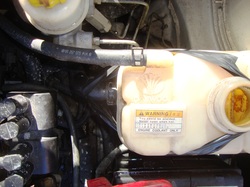
After much joking (and a good dose of worry) over worst case scenarios in terms of what health problem the car was experiencing, we discovered it was all because of a leak in the coolant reservoir. This is fortunate, at least it wasn't the radiator or the engine which would have been much more costly!
This occurred after the car had received a full mechanical service just a week ago.
What does this have to do with nutrition, you might ask?

Until of course the leaking, heavily deteriorated hose carrying coolant to the radiator finally gave way completely. By the road yesterday we couldn't help but notice the hose was already in tatters, an observation seemingly overlooked by the guys to whom I paid $200 to "service" my car!
I feel more than a little pissed off, since a lot of pain could have been avoided had the mechanic looked just a little deeper and asked, "why was there no coolant left in the container?"
Had this happened, perhaps they would have noticed the highly eroded hose attachment leaking coolant all over the shop, and fixed the problem not by simply topping up the fluid, but by addressing the root cause of the problem.
Allopathic machanics 101
Such solutions reek of the allopathic approach. I don't have an issue with iron supplementation during pregnancy, temporary times of stress, or following some kind of traumatic or medical blood loss. Having worked as an emergency room vet, I see the great value in acute pain-relief drugs, antibiotics and sedatives.
But I do have a problem when naturopaths, or anyone else for that matter, prescribe nutrients or drugs on a long-term basis without at least addressing the root cause of a problem, rendering patients dependent on their coolant top up/expensive supplement whilst the stuff leaks out through a broken hose, an undiagnosed gut absorption condition, or a diet lacking in natural sources of iron and a lifestyle saturated in work-induced cortisol overdrive and acidic relationships.
Addressing nutrient deficiencies is a very important part of nutritional and general medicine, don't get me wrong. But health care doesn't stop at a supplement sale. It should always be accompanied by lifestyle interventions, detoxification, and a good hard look at any underlying limiting beliefs, unaddressed emotional issues, misdirected attitudes and unhealthy behaviours.
The question is not, "What is the drug/supplement/surgery of choice for condition x", but rather, "Why do I have condition x?" " Why do I have an iron deficiency?" Or, "What is the deeper issue behind my headache?"
Unfortunately, the education, training, and reimbursement of all types of health professionals (including naturopaths, doctors, dietitians etc), are often focused on treating disease using drugs, supplements and surgery rather than comprehensive patient-centered treatments focused on the individual. For example, as reported in a study published in the British Medical Journal (1), the four most common types of clinical questions are:
1. What is the drug of choice for condition x?
2. What is the cause of symptom x?
3. What test is indicated in situation x?
4. What is the dose of drug x?
This shortsighted approach to health care (and mechanics) should give us all cause for serious concern, because it is perpetuating a system that is far too costly and increasingly ineffective for the prevention and management of chronic diseases whose root causes are to be found in a much more complex perspective on patients’ lives.
I won't be taking my car back to the same mechanic, that's for sure.
1. Ely JW, Osheroff JA, Gorman PN, et al. A taxonomy of generic clinical questions: classification study. BMJ. 2000;321:429-32.

































 RSS Feed
RSS Feed



